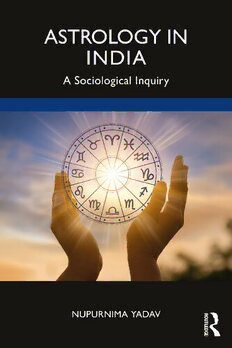
Astrology in India: A Sociological Inquiry PDF
Preview Astrology in India: A Sociological Inquiry
ASTROLOGY IN INDIA This book critically examines the larger world of astrology in India, its ubiquity and relationship with religion, caste, gender, class and aspirations. It looks at astrology through an empirical and phenomenological lens, ana- lyzing different meanings and questions associated with it. How do people see astrology—as magic, science, religion, or a knowledge system? The volume anal- yses the role of astrology in religious and social ceremonies; the interplay of faith and fear; beliefs, practices, mysticism, and scepticism in middle-class households; and gendered negotiations in everyday life. It also delves into how astrology has emerged as a livelihood and an industry, the continued fascination with it even in an era of technological advancement, and its domination of the vernacular media. Insightful and highly comprehensive, this book will be useful for scholars and researchers of sociology, political sociology, social anthropology, anthropology, cultural studies, gender studies and urban Sociology. Nupurnima Yadav did her PhD from the Centre for the Study of Social Sys- tems, Jawaharlal Nehru University. She is currently working as an Assistant Profes- sor in the Department of Sociology at Sri Venkateswara College. Her publications include her recent co-edited book Sociology of India 2021, Creative Destruction and Enterprising Economy, in the (eds) Crisis of Social Transformation in India 2015, Fearsome goddess Seetala and Faithful Communities, Nidan: International Journal for the Study of Hinduism. ASTROLOGY IN INDIA A Sociological Inquiry Nupurnima Yadav First published 2022 by Routledge 2 Park Square, Milton Park, Abingdon, Oxon OX14 4RN and by Routledge 605 Third Avenue, New York, NY 10158 Routledge is an imprint of the Taylor & Francis Group, an informa business © 2022 Nupurnima Yadav The right of Nupurnima Yadav to be identified as author of this work has been asserted by her in accordance with sections 77 and 78 of the Copyright, Designs and Patents Act 1988. All rights reserved. No part of this book may be reprinted or reproduced or utilised in any form or by any electronic, mechanical, or other means, now known or hereafter invented, including photocopying and recording, or in any information storage or retrieval system, without permission in writing from the publishers. Trademark notice: Product or corporate names may be trademarks or registered trademarks, and are used only for identification and explanation without intent to infringe. British Library Cataloguing-in-Publication Data A catalogue record for this book is available from the British Library Library of Congress Cataloging-in-Publication Data A catalog record has been requested for this book ISBN: 978-0-367-53064-8 (hbk) ISBN: 978-0-367-55391-3 (pbk) ISBN: 978-1-003-09329-9 (ebk) DOI: 10.4324/9781003093299 Typeset in Bembo by KnowledgeWorks Global Ltd. Dedicated to my beloved father CONTENTS List of figures vii List of tables viii Foreword ix Acknowledgements xii Glossary xiii 1 Introduction 1 2 Astrology and fluid boundaries of the field 22 3 Understanding the system of astrology 41 4 Words of the practitioners: Astrologers and operational astrology 65 5 Middle class households: Beliefs, practices, and refutation 93 6 Mediated astrology through religious conventions and technology 118 7 Conclusion 144 Bibliography 157 Annexures 173 Index 177 FIGURES 2.1 Regional representation of believers versus non-believers in Delhi and NCR 33 3.1 Representation of believers in astrology 59 4.1 Representation of a total number of participants versus non-believers who consulted astrologers 67 4.2 Representation of men and women believers who visited astrologers 78 5.1 Representation of men and women believers 101 5.2 Representation of women and men non-believers 110 TABLES 1.1 Occupational profile of the participants 17 2.1 Different moon signs and their constituents 27 2.2 Description of focused group discussions 27 3.1 Elucidation of twelve houses of a kundli and their significance 62 4.1 Planets and their specialisation 82 2A.1 Number of believers versus non-believers 173 3A.1 Number of believers in astrology 173 4A.1 Number of total participants and non-believers who visited astrologers 173 4A.2 Number of men and women believers who visited astrologers 174 5A.1 Number of men and women believers 174 5A.2 Number of men and women non-believers 174 FOREWORD Sociologists and social anthropologists in India have often focused on the role of the Hindu religion, its beliefs and practices and functions in diverse commu- nities. The pantheon of deities, cosmological beliefs, constellations, nature and culture interface and body and cosmos relationships are the staple of understand- ing how Indian lives are structured. These also inform the agential aspects of everyday practices. The existence of so-called non-western ways of knowing the world, natural, human and supernatural entailed in epistemologies, understood as “non-scientific”, call for systematic exploration of the knowledge systems. Their utilization in social lives of communities is an empirical question to be examined by social scientists. Astrology is often considered by rationalists as occult science, illogical with little scientific evidence with dubious predictive value. For its practitioners and consumers, however, it remains real, logical, and very important to understand how in local cosmic configurations, humans are entangled? Its instrumentality and in which ways it could help find solutions to queries, sufferings and crises of life are often seen as useful and even essential in certain life situations. Astrology as a knowledge system invokes mystical beliefs, magical practices and assumed logic to deal with existential questions and help find solutions. In recent times, the overt government support to “Indian tradi- tions, beliefs and practices” has helped reduce the orthodoxies and often justified astrology and other epistemologies especially related to health and well-being as important assets. Though understood as an ancient system, astrology today has emerged a very useful resource, widely used by middle-class Indians. In recent years, uncer- tainties about life and a desire to control nature and destiny might be propelling its wide-scale consumption. Sociologists and Social anthropologists have, how- ever, not paid sufficient attention to this phenomenon. Understood as a tradi- tional, scripture-based knowledge and practice, in recent years, it has taken new
